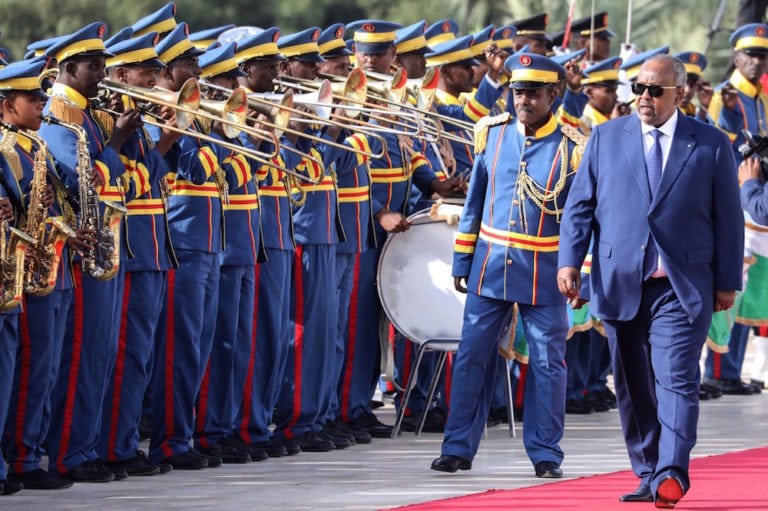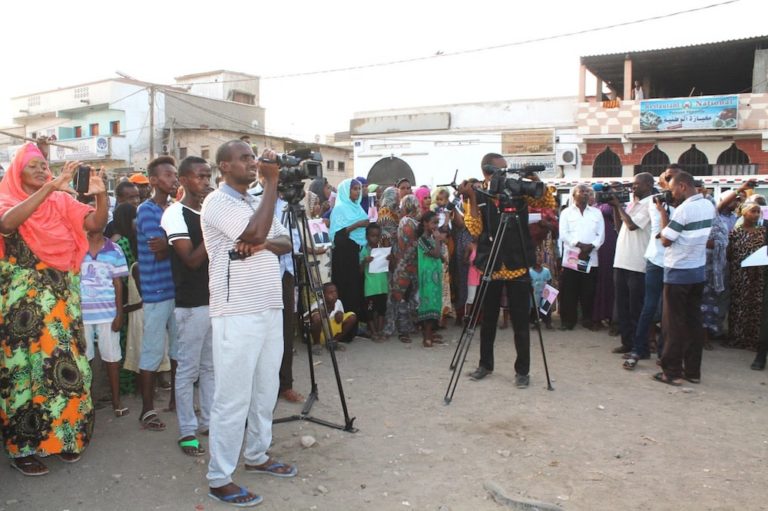(RSF/IFEX) – RSF has protested against the re-arrest of newspaper editor Daher Ahmed Farah on 5 June 2003, just two days after his release from custody. The organisation has called on the authorities to release him immediately. The editor of “Le Renouveau” newspaper and head of the opposition party Movement for Democratic Renewal and Development […]
(RSF/IFEX) – RSF has protested against the re-arrest of newspaper editor Daher Ahmed Farah on 5 June 2003, just two days after his release from custody. The organisation has called on the authorities to release him immediately. The editor of “Le Renouveau” newspaper and head of the opposition party Movement for Democratic Renewal and Development (MRD), Farah is the subject of several libel suits filed by the armed forces.
“Although he was placed back in custody for a different matter from the one for which he was previously released, we are outraged by this utterly unjustified decision,” RSF Secretary-General Robert Ménard said in a letter to State Prosecutor Djama Souleiman Ali. “Farah was simply exercising his right to inform the public, a right guaranteed by several international treaties ratified by the Republic of Djibouti,” Ménard noted.
In his letter to the state prosecutor, Ménard referred to the opinion of Stéphane Zerbib, a lawyer hired by RSF to defend Farah because no lawyer in Djibouti was willing to take the case. Zerbib said Farah’s re-arrest was all the more unjustified since General Zakaria Cheik Ibrahim, the army’s chief of staff, had offered to withdraw his lawsuit in return for a letter of apology. Farah declined, but, as Ménard noted, if the editor could have avoided prosecution simply by apologising, imprisonment seems even more disproportionate to the wrong Zakaria claims to have suffered.
Ménard also reminded the state prosecutor that the United Nations condemns imprisonment for the peaceful expression of an opinion and views it as a serious human rights violation.
On 28 May, the Appeal Court reduced the sentence that had been passed on 7 April in one of Zakaria’s libel suits against Farah, over a 6 March article accusing the army high command of carrying out politically-motivated dismissals. However, the court’s decision is still a very heavy sentence for a press crime, namely a four-month suspended prison sentence and 500,000 Djibouti francs (approx. US$2,800; 2,400 euros) in damages. Farah was originally handed a six-month suspended prison sentence and ordered to pay a fine of 200,000 Djibouti francs (approx. US$1,200; 1,000 euros) and 2 million Djibouti francs (approx. US$11,800; 10,000 euros) in damages.
“Le Renouveau” criticised the army again on 17 April, accusing it of lacking “neutrality” and saying it “should be apolitical.” As a result, Farah was arrested three days later, but he requested a provisional release and it was finally granted by the investigating judge on 3 June.
The prosecutor appealed against the release, obtaining an order for Farah’s re-arrest. This was carried out on the morning of 5 June by criminal investigation and special affairs police who detained him at his mother’s home, where he had spent the night. They took him to Gabode prison, where he had earlier been held in appalling conditions.
Farah has also been prosecuted for “undermining the army’s morale” as a result of a complaint by another general and the Defence Ministry. His appeal against his six-month suspended prison sentence and 200,000 Djibouti franc fine in the case has not yet been heard.
The editor has been detained several times over the past few years. In most cases, he was prosecuted for press offences and sentenced to prison terms or fines.


